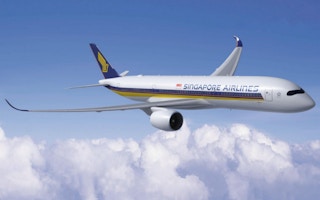A number of Asian airlines have started selling flights without a destination to generate much-needed revenue, to the consternation of community groups and environmentalists.
To continue reading, subscribe to Eco‑Business.
There's something for everyone. We offer a range of subscription plans.
- Access our stories and receive our Insights Weekly newsletter with the free EB Member plan.
- Unlock unlimited access to our content and archive with EB Circle.
- Publish your content with EB Premium.
Singapore Airlines (SIA) is the latest carrier to consider offering “flights to nowhere”, whereby planes take off and land at the same airport, giving passengers a taste of the travel experience with three hours on board an Airbus A350 jet.
The company is expected to launch no-destination flights at the end of October, bundled with staycations, airport shopping vouchers and limousine services.
The news emerged the week after Singapore’s national carrier announced it would cut 4,300 staff positions, and six months after it secured a S$19 billion (US$13 billion) bail-out package to help the company survive the coronavirus pandemic.
The response to the news was mixed. Some netizens were supportive while others pointed to the environmental impact of an industry that accounted for 2 per cent of global emissions before the Covid-19 outbreak.
Jon Carlo Alivio wrote on Facebook: “All that carbon footprint, and for what? Singapore Airlines better not market themselves as a company that cares about environmental sustainability.”
A consumer group called ‘SaveSingaporeAirlines’ launched a digital form to drum up ideas for low-carbon alternatives to flights to nowhere on Saturday.
In a note addressed to fans of the airline, the group’s creators — Chevon Low, a community builder for green group People’s Movement to Stop Haze, student Sean Yap, content creator Melanie Ang and job seeker Mark Tszo — said they are Singaporeans concerned about the wasted emissions of the flights: “We think SIA can do better, and we think all of us can lend a hand.”
The platform, which will be sent to SIA’s chief executive Goh Choon Phong, has already garnered 400 responses. Ideas include flying lessons for children, inflight fine-dining experiences, cockpit tours and wedding shoots, Low told Eco-Business.
The global airline industry is expected to lose US$252 billion in revenue by the end of this year, and carriers in the region have been launching no-destination offerings to bring in revenue lost to travel restrictions.
Taiwan’s Eva Air launched a flight to nowhere service on a Hello Kitty-branded plane to mark national Father’s Day in August. Domestic rival Starlux followed suit. Japan’s ANA Holdings sold a charter flight to nowhere on its Tokyo-Honolulu route, with crew wearing Hawaiian shirts and serving cocktails.
Australia’s Qantas has rented out its aircraft for sightseeing trips over Antarctica, while Korea’s Asiana Airlines has been flying empty A380 superjumbos to keep its pilots certified.
Thai Airways has set up a cafe to provide the inflight experience and meals — but without flying involved.
Air New Zealand told Eco-Business that the firm had “no need to operate such [no-destination] flights as our domestic network in New Zealand is up and running.”
In response to SIA’s flights to nowhere plan, SG Climate Rally, a Singapore-based environmental campaign group, said that while it sympathised with those who have lost their jobs, it is against the initiative.
Flights to nowhere “encourage carbon-intensive travel for no good reason and is merely a stop-gap measure that distracts from the policy and value shifts necessary to mitigate the climate crisis”, the group stated today, Monday 14 September.
“This initiative is symptomatic of a culture that makes consumers responsible for deep-rooted, structural problems. In reality, the onus should be on SIA executives and policymakers to pivot towards more sustainable and equitable alternatives for its customers and staff,” it said.
SG Climate Rally said that the rapid decline of the airline industry “should beckon us to question whether carbon-intensive travel is a sustainable source of revenue for our country.”
In response to queries, an SIA spokesperson said: “Singapore Airlines is considering several initiatives that would allow us to continue engaging both our customers and members of the public. Currently, none of these plans have been firmed up. We will make an announcement at the appropriate time if we go ahead with these initiatives.”











